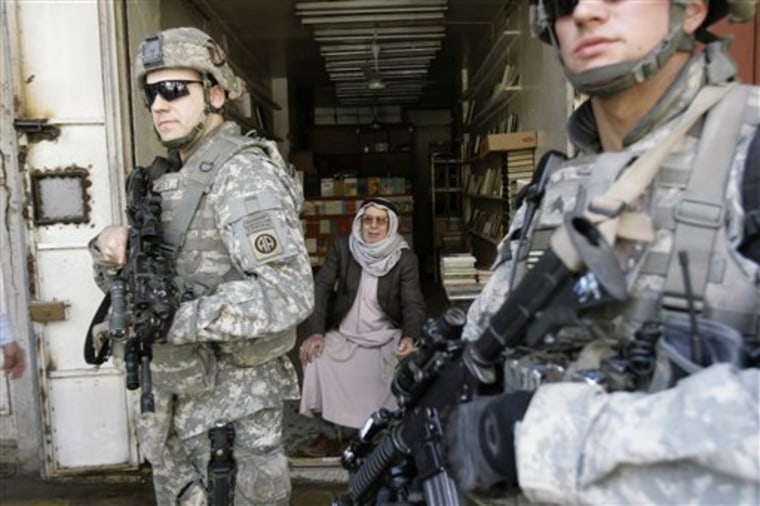Rockets slammed into an Iraqi housing complex near the Baghdad international airport and a nearby U.S. military base on Monday, killing at least five people and wounding 16, including two U.S. soldiers, officials said.
American troops arrested six Iraqis in the vicinity of the apparent launching sites, and there was strong evidence the suspects were involved, a military official said.
The brazen attack followed a weekend in which U.S. and Iraqi officials touted the security gains of a year-old operation in Baghdad that included an influx of some 30,000 extra American troops. Rocket and mortar attacks were once a daily occurrence but have tapered off with a general decline in violence in the capital.
Twelve 107 mm rockets fell in and around the airport and the nearby Camp Victory, the main U.S. military base on the western outskirts of Baghdad, the U.S. military official said, speaking on condition of anonymity because the information has not been officially released.
He said Camp Victory was hit and two soldiers suffered light injuries but the bulk of the casualties were in a housing complex for airport employees, about a half a mile from the airport.
Five Iraqis were killed and 14 wounded, including five children, one baby, one adult and a teenager who were taken to a nearby U.S. medical facility to be treated, the official said.
The U.S. military did not respond with fire but sent a team in the direction of the launching sites, arresting six people in the area, the official said.
Residents in the housing complex said it includes 250-300 trailers primarily occupied by airport employees. They said two trailers were destroyed in the attack.
"One of these two families lost four of its sons, three of them were buried under the debris," one resident said, adding those killed were between 10 to 20 years old.
Iraqi police earlier reported that six to 13 rockets also struck the U.S.-protected Green Zone on Monday afternoon, but the U.S. military official denied that report.
Shiite militia leader captured
Iraqi officials spent the weekend celebrating the successes of a crackdown that began on Feb. 14, 2007, and saw the eventual buildup of some 30,000 extra American troops. But the U.S. military has been more cautious, warning Shiite and Sunni extremists remain a serious threat.
U.S. troops on Monday captured a breakaway Shiite militia leader suspected of being a powerful criminal boss and providing Iranian weapons to fighters in western Baghdad, the military said.
The arrest occurred a day after a U.S. military spokesman said that, in the past week, Iraqi and U.S. forces had captured 212 weapons caches around the country, with growing evidence of an Iranian link.
"This is a significant capture of a top special groups leader," said Navy Capt. Vic Beck, a military spokesman. "Special groups" is a term the U.S. uses to describe Iranian-backed Shiite Muslim militias it says have broken with anti-U.S. cleric Muqtada al-Sadr and refused to follow his cease-fire order.
The military said in a statement that intelligence reports led troops to the suspect, who was not identified, and he and another suspect were arrested without incident.
Back in Baghdad, the main suspect arrested was reportedly in charge of all Shiite militia fighters in the western half of the city. The area west of the Tigris River that divides the capital has been a Sunni stronghold but has seen an increased Shiite presence with sectarian cleansing that peaked after the Feb. 22, 2006, bombing of a Shiite mosque in Samarra.
The military said the suspect was responsible for providing weapons to militia members, including armor-piercing bombs known as explosively formed penetrators, or EFPs, which U.S. officials say come from Iran. Tehran denies the allegations.
The man also allegedly selected fighters for paramilitary training and was an associate of other senior criminal leaders involved in attacks on U.S. and Iraqi security forces, the military said.
Shiite cease-fire ends this month
Al-Sadr pledged last year that his Mahdi Army last year would abide by a six-month cease-fire that has helped substantially decrease violence in Iraq, and that expires at the end of this month. But rogue groups have spun away from his organization and are receiving both Iranian training and weapons, including the EFPs, the U.S. says.
Rear Adm. Gregory Smith, a U.S. spokesman, said Sunday that the military has seen an increase in the use of weapons by Iranian-backed Shiite extremists. Many of the caches had been in Iraq for some time and Smith declined to link them to an increased flow of weapons into the country, but he said training and financing of the groups continues.
"In just the past week, Iraqi and coalition forces captured 212 weapons caches across Iraq, two of those coming from here inside Baghdad, with growing links to the Iranian-backed special groups," he said Sunday at a news conference.
"The Iranian-backed special groups in particular are volatile in the sense that they receive specific training inside of Iran," Smith added. "What we don't know precisely is whether or not there's any direction coming from Iran as to how they conduct their operations inside of Iraq. We do think that the training and financing of those activities remain in place."
Violence in Mosul
In other violence Monday, a roadside bombing in the northwestern city of Mosul killed three civilians and wounded four others, police said. The city is what the U.S. describes as the last major urban stronghold of al-Qaida in Iraq.
The U.S. military also blamed al-Qaida in Iraq for a female suicide bombing on Sunday. The woman's explosives belt detonated after soldiers fired three bullets at her, the military said.
Casualty figures were disputed in Sunday's attack. Two doctors and a police officer, who spoke on condition of anonymity because they weren't authorized to release the information, said four people were killed and 12 wounded. The U.S. military, however, said the only death in the explosion was the bomber, although two Iraqi army soldiers were wounded.
